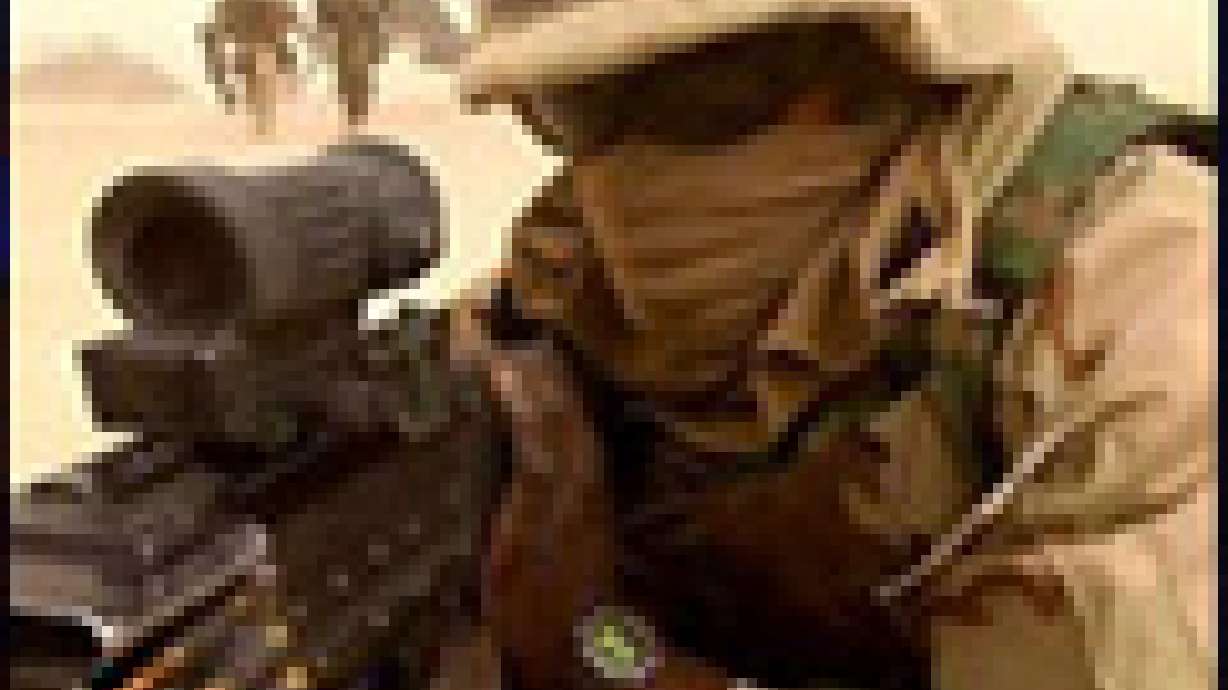Estimated read time: 3-4 minutes
This archived news story is available only for your personal, non-commercial use. Information in the story may be outdated or superseded by additional information. Reading or replaying the story in its archived form does not constitute a republication of the story.
NEAR KHAZER, Iraq (AP) -- U.S. warplanes pounded front-line forces in the north Thursday after Iraqi troops retreated from strategic hilltop positions, which were quickly picked clean by Kurds in a frenzy of battlefield plunder.
Nearly anything of value was carried away -- from shoelaces to wooden poles to metal sinks. One boy walked home with a green-and-white Iraqi Airlines umbrella. Another carried home a torn stretcher.
In the past week, Iraqi forces near the Kurdish zone have faced relentless air attacks and pulled back toward the two main northern districts in Baghdad's hands: the commercial hub of Mosul and the important oil center around Kirkuk.
The latest retreat left Kurdish and U.S. forces less than 18 miles from Mosul. Iraqi soldiers were struggling to hold control of the village of Khazer, which is six miles from the vast fortifications overlooking Kurdish-held Kalak that they fled Wednesday.
Kurds also used the backing of U.S. airstrikes Thursday night to repel an Iraqi attempt to retake a bridge on the road to Mosul that the Kurds won two nights earlier. U.S. forces estimated 50 Iraqis were killed but there were no casualties among the Kurds or Americans.
With fewer than 2,000 ground troops in the Western-protected Kurdish zone, the Pentagon has relied on sustained airstrikes against the lead Iraqi units. The strategy has allowed Kurdish militiamen to advance unchallenged and keeps intact the U.S. pledge to Turkey to block any independent Kurdish offensive.
Turkey strongly opposes a Kurdish push to claim the cities -- especially Kirkuk -- fearing full Kurdish control of Iraq's No. 2 oil region could eventually stir efforts for independence and encourage Turkish Kurdish separatists. Iraqi Kurds consider Kirkuk and Mosul part of their historical ethnic lands.
But the U.S.-imposed brakes on the Kurdish fighters could be easing as coalition forces move into Baghdad.
In former Iraqi foxholes near Khazer, U.S. Army soldiers apparently helped direct the airstrikes while Kurdish special forces nearby probed the Iraqi lines. A Kurdish sharpshooter looked for Iraqi targets near a bridge spanning a small river.
F-14 Tomcats circled over the Iraqi positions about every 15 minutes during the heaviest bombing. Columns of black smoke rose from the Iraqi lines.
The Iraqis could do nothing against the warplanes. But they answered with mortars and machine gun fire toward Kurdish positions. Several mortar strikes hit Kalak, injuring at least one civilian, Kurdish officials said.
At midday, some Kurdish militiamen stopped to pray in a grassy pasture as a pair of Tomcats passed overhead.
Down the road toward Kalak, meanwhile, thousands of Kurds swarmed the abandoned Iraqi bunkers and barracks in a looting free-for-all that the Kurdish militia made no attempt to control.
Ishmail Hasan loaded his motorcycle and sidecar with plastic chairs, cooking pots, car batteries and a plastic foam cooler.
"I'm keeping some and selling the rest," he said. "Thank you, Saddam."
The dangers of unexploded shells and possible mine fields seemed totally overlooked. It was a windfall in a region where a $300-a-month salary is coveted.
Boys raced into fields to grab helmets and gas masks. Men used pickaxes to pry a cistern from its foundation.
In a cinderblock hut, a man tried on discarded Iraqi military boots until he found a pair that fit. He wore them home.
The Iraqi positions, which had stretched for more than a mile over treeless hills, were considered among Baghdad's most important outposts since the Kurds came under U.S.-led protection following the 1991 Gulf War.
"I stared up at these soldiers for more than a decade," said Hamid Aziz Mohammed, who loaded sheets of corrugated metal onto his truck. "Now they are gone and I'm taking what I want. God is great."
(Copyright 2003 by The Associated Press. All Rights Reserved.)








